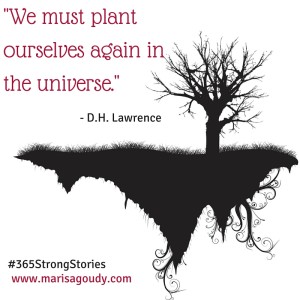How writing about painful moments allows us to connect to readers
It is a question, practically of relationship. We must get back into relation, vivid and nourishing relation to the cosmos and the universe. . . . For the truth is, we are perishing for lack of fulfillment of our greater needs, we are cut off from the great sources of our inward nourishment and renewal, sources which flow eternally in the universe. Vitally, the human race is dying. It is like a great uprooted tree, with its roots in the air. We must plant ourselves again in the universe. D.H. Lawrence, from Lady Chatterley’s Lover
 When I heard Tara Brach share this passage, it would have been a good idea to pull over. How could I keep my eyes on the road when I felt like my heart was tearing open so it could reach out and grab at truth?
When I heard Tara Brach share this passage, it would have been a good idea to pull over. How could I keep my eyes on the road when I felt like my heart was tearing open so it could reach out and grab at truth?
When I came home and Googled Lawrence’s words, I found Tara again. This time, seeing her quote him in print in a blog post, I just let the sobs erupt through that jagged hole in my chest.
Wait. Let me pause for a moment. Torn open, sobbing, and all jagged… A dying human race?
Is this all too much? Is this what you expect from that nice writing coach with the family stories and the infatuation with Irish poetry?
Just for a moment (and maybe longer), the fear and worry comes to the surface
In truth, I think we all worry that our disconnection from the earth and from one another is a problem.
(And, based on what my open-hearted, socially conscious friends and I share with one another, that’s often an understatement - some days that fear is the thief of joy and we worry about everything from cancer to rising oceans.)
And yet, we dance on. Sometimes, we numb out and turn up the music too loud and refuse to examine these concerns. Or, because we have faith that we are planting ourselves in the universe and there is still time for the seedlings to create a new forest before we all run out of air, we take hopeful, inspired action.
But as healers and clinicians, we’re no stranger to the shadow places
For those of us who are healers, for those of us in the vulnerability business, these “humanity is a great uprooted tree” fears are something to be embraced - or at least something not to be avoided.
After all, we know that numbing out and running away never solved anything. Plus, it is because there is a collective sense of being “cut off” that we must offer our work to those who need nourishment and renewal.
Pervasive suffering and separation and the yearning for reconnection is the “why” of our work. Or rather, soothing that separation and bringing an end to suffering is the “why.”
Our marketplace and our economy may be telling us that what passes for relentless optimism - buy more, make more, dig more - is the only way to growth and fulfillment. Instead, we know that “more” won’t necessarily satisfy the “greater needs” that Lawrence wrote about. (Hard to believe the book was published almost 90 years ago, isn’t it? His observations about industrialization and alienation feel so fresh and necessary today.)
We know that true evolution is found in exposing the roots of the pain and the disfunction and that we can consciously, hopefully plant something that will nourish the individual and nourish our world.
Yes, the pain, the worry, and the fear have a place in your writing - and hope does too
You’ve heard about addressing the pain points in your copy. Show the reader that you understand their problems and then offer up your solutions.
Pain has a pace in your storytelling too. It plays a role in your content creation and your blogging.
Allowing yourself to “feel the feelings” and staying open to something like a podcast or a passage from century-old novel that cuts you to the bone will help you create content that connects. It will help you speak the truth that your readers long to hear.
Even in our Instagramable world, people do want wisdom that cuts a little deeper - especially when you also serve up hope and transformation through the brilliant work that you do.
Dare to tell your painful stories once you have done your own healing. It's the healing that speaks to the soul and helps us reestablish a collective root system.
